Domestic work and slavery reports
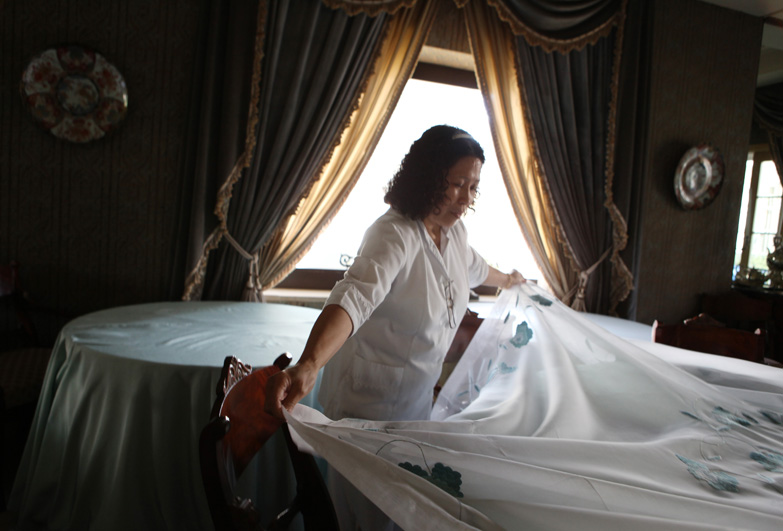
Joint Submission for the Universal Periodic Review of the UK – Migrant Domestic Workers
Anti-Slavery International, Dignity at Work, Focus on Labour Exploitation, Kalayaan, Kanlungan, and The Voice of Domestic Workers.
Migrant domestic workers in the UK – the majority of whom are women – continue to suffer from widespread abuse and exploitation, including situations of trafficking and modern slavery. The Overseas Domestic Worker visa increases vulnerability to exploitation as it restricts migrant domestic workers to a non-renewable six-month visa. While there are mechanisms in place to identify and provide support to victims of trafficking and modern slavery in the UK, these only apply to migrant domestic workers whose treatment amounts to the legal definition of trafficking and modern slavery. Ahead of the 2022 Universal Periodic Review of the UK, Anti-Slavery International, along with other organisations, submitted evidence relating to migrant domestic workers in the UK.
Joint Submission for the the Universal Periodic Review of the UK:
Protecting Child Domestic Workers in Tanzania: Evaluating the scalability and impact of the drafting and adopting of local district bylaws
Rights Lab, University of Nottingham, Anti-Slavery International.
Facing high population growth and extreme poverty, domestic work in Tanzania offers the opportunity for children with little education to enter paid employment. This report describes an evaluation and analysis of the impact of the drafting, and prospective adoption, of local bylaws designed to protect the rights of such Child Domestic Workers (CDWs) in the districts of Ilemela and Nyamagana in the Mwanza region of Tanzania.
2016 Submission on bonded labour, trafficking and domestic work in India
Anti-Slavery International, Jan Jagriti Jendra, The National Domestic Workers’ Movement, and Volunteers for Social Justice.
This submission to the Universal Periodic Review of India, focuses on slavery practices in India. These include bonded labour, which occurs across a variety of sectors; trafficking in persons within Indian borders; and the widespread abuse and exploitation of women working as domestic workers, including trafficking of children for domestic servitude. The submission also focuses on cases of trafficking and forced labour of workers migrating internationally. It is based on information gathered through a number of different projects in India by the above named organisations.
2016 Submission on bonded labour, trafficking and domestic work in India:
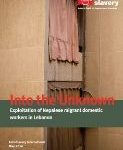
Into the Unknown: Exploitation of Nepalese migrant domestic workers in Lebanon
Audrey Guichon, Anti-Slavery International.
New research looking at the vulnerabilities to widespread abuse of Nepalese migrant domestic workers in Lebanon rooted directly in the systems in place in both home and destination countries. It also looks at the work Anti-Slavery and its partners have done to reduce these vulnerabilities and the first signs of change.
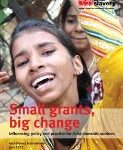
Small Grants, Big Change: Influencing policy and practice for child domestic workers
Anti-Slavery International.
This report examines Anti-Slavery International’s project aimed at improving lives of child domestic workers by the realisation of a small grant scheme (SGS). This fresh approach for Anti-Slavery International and its partners in Costa Rica, India, Peru, Philippines, Tanzania and Togo has seen 52 fledgling local groups many led by child domestic workers themselves – provided with funds to support child domestic workers and influence policies and practices towards them across 9 countries. Closely monitored and mentored by project partners since 2009, these local groups have directly assisted thousands of child domestic workers and have changed the attitudes of local and national duty bearers to improve the lives of many more.
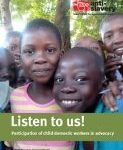
Listen to Us! Participation of child domestic workers in advocacy
Anti-Slavery International.
This report summarizes Anti-Slavery International’s project run in six countries aimed at improving lives of child domestic workers by involving them in advocacy activities. This fresh approach for Anti-Slavery International and its partners in Costa Rica, India, Peru, Philippines, Tanzania and Togo has seen child domestic workers develop their own advocacy projects and increased the opportunities of children to be empowered to actively claim their rights with decision-makers.
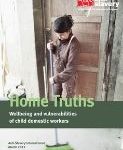
Home Truths: wellbeing and vulnerabilities of child domestic workers
Based on interviews with around 3,000 children the report is a study into the psychosocial wellbeing of child domestic workers across six countries in three continents (Peru, Costa Rica, Togo, Tanzania, India and Philippines). This report makes an important contribution to our understanding of child domestic work and provides important indicators for the circumstances that affect these child workers as well as the aspects of their lives that contribute to their wellbeing in a positive way.
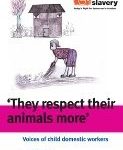
‘They Respect Their Animals More’: Voices of child domestic workers
Anti-Slavery International, Jonathan Blagbrough.
This report is the product of group discussions and individual interviews with more than 400 current and former child domestic workers from urban and rural areas in Benin, Costa Rica, India, Nepal, Peru, Philippines, Tanzania and Togo, to inform about the situation and needs of child domestic workers in order to better target programmes and policies on the issue. It also aims to encourage thinking about child domestic workers not simply as subjects of concern, but as social actors able to articulate their needs and capable of transforming their own lives, and the lives of others.ISBN:978 0 900918 65 9
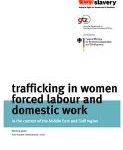
Trafficking in Women, Forced Labour and Domestic Work: In the Context of the Middle East and Gulf region
Anti-Slavery International.
This report investigates the experiences of women migrant domestic workers in the Middle East and Gulf, the dynamics and workings of the migration process and whether and how it contributes to trafficking. Also included is an examination of some of the key, inter-connecting dynamics between slavery, trafficking, migration and forced labour, focusing particularly on examples of sending, receiving and transit countries including Egypt, Ethiopia, Eritrea, Lebanon, Sudan and Yemen.
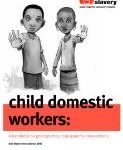
Child Domestic Workers: A handbook on good practice in programme interventions
Maggie Black, Anti-Slavery International.
A practical guide to what works and why when it comes to practical assistance for child domestic workers. Contains experiences of local practitioners from Africa, Asia, Latin America and the Caribbean; international organisations and networks working on this issue. And the views of almost 500 current and former child domestics consulted in nine countries. A companion publication detailing the results of these consultations will follow in early 2006. Particularly useful for small and medium-sized NGOs seeking ways to improve their existing programmes or planning to add assisting child domestic workers to their activities. ISBN 0 900918 59 4
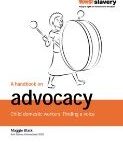
Child Domestic Workers: Finding a voice, a handbook on advocacy
Maggie Black, Anti-Slavery International.
This book draws on the experience of activists from 17 countries and representatives of internaitonal and regional agencies who attended a workshop that Anti-Slavery International convened in April 2001. A practical “how to” guide which will help local level NGOs and activists plan, design, implement and evaluate the impact of an advocacy strategy on child domestic workers. ISBN 0 900918 51 9.
International Workshop for Practitioners on Child Domestic Work – Summary Report
Anti-Slavery International.
In April 2001, Anti-Slavery International held an international workshop for practitioners on child domestic work. This is a 10-page summary report of this meeting. The complete handbook is available above.
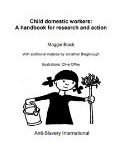
Child Domestic Workers: research and action handbook
Anti-Slavery International.
This practical “how to” guide draws on the experiences and views of non-governmental organisations and others working with child domestics in Asia, Africa and Latin America, offering useful insights for anyone who wants to help the children concerned. ISBN 0 9009 18 41 1